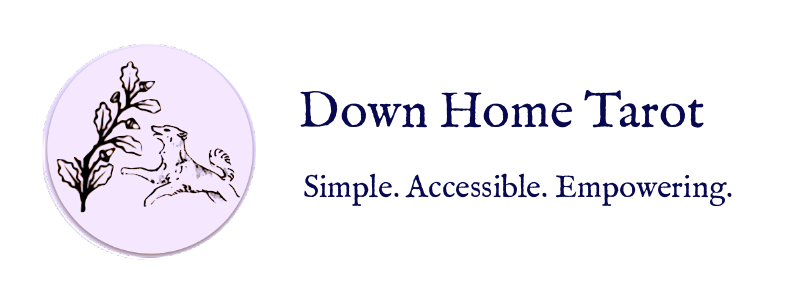As I've mentioned before, I start reading tarot out of
geekiness rather than mysticism. The Wind Chimes spread, however, is a clear result of my mystic side. I wanted to develop a spread that was simple, and focused on high-intensity emotions while still providing a sense of calm. While working on such a spread, I heard my recently-hung wind chimes gently sound from the backyard. As anyone with wind chimes can attest, wind chimes help soothe and clarify, and I was able to come up with the following spread. I imagine each card sounding out its own clear note to form shifting harmonies of meaning.
********************
Our emotional lives can be sources of great energy, motivation, and self-awareness, but they can also lead us to confusion and disorientation. We incorporate intense emotional experiences into our sense of self over time, so stating that an emotion is "ordered" or "disordered" is not a way to pass judgment, but rather a way to identify where we are in the process.
CARD 1: What makes you sing? (
Where are your emotions intense, but coherent?)
It took me awhile to get to know the
seven of swords--he's got a bit of a shit-eating grin that can be off-putting--but I've learned to recognize the lessons he brings. He's sneaking away with an armful of swords, looking over his shoulder gleefully at the two he's left behind. I get the impression that carnival behind him wasn't actually that great, and he's managing to get out of a bad situation in the best shape possible. While working to disconnect myself from some previous, unhelpful beliefs, I recently came to a point where I am content with that loss. The loss is still intense, but I have a coherent sense of what it means for me as a person.
CARD 2: What makes you shout? (
Where are your emotions disordered?)
The Magician has been popping up a lot for me. The Magician is about synthesizing all aspects of yourself in order to manifest your dreams. No big deal, right? Of course I'm still disordered around these emotions; I'm trying to honor new aspects of myself while trying to determine what my true desires even are. An exciting time in my life, to be sure, but absolutely still a measure of disorder!
CARD 3: What makes you cry? (
What do you process internally?)
I get the
two of wands a lot, too. This card is actually about using a solid sense of self to build on. Like anybody, I consult people I trust and respect when I am struggling, but at the end of the day, I am comfortable relying on my inner moral compass. Ultimately, this card reflects to me that my sense of self comes largely from my internal processes, and less from how others define me. I hope I can live up to it!
CARD 4: What makes you laugh? (
What do you process externally?)
Guys, I think the
Page of Cups is just a little sweetheart. I don't know if it's the pink stockings, that charming curtsy, or the fact that the dude is carrying around a fish in a goblet. He ultimately signifies trust in the validity of our emotions; the truth is, I often check in with a few loved ones to evaluate the appropriateness of my emotional responses. This can be really, really healthy if you are being gaslighted and need to check in with somebody you trust, or if you are caught in a self-destructive spiral; however, I don't want to let it invalidate my own emotional responses. This card encourages me to pay attention to how often and when I rely on others to validate my emotions.
CARD 5: What orchestrates your passions? (
What concept ties together your emotional reality?)
Of course the court of cups is making a strong appearance in a spread about emotions. The
King of Cups is, naturally, a leader who relies on his emotional intelligence; I think of him as a leader who embraces charity and intuition. He's not quite as naive as, say, the Page, though; the King understands that our emotions must be balanced with other information and pragmatism. In orchestrating my emotions and their varying levels of intensity, it's important for me to remember that all of my reactions are valid in their contribution to my internal symphony of self. It's perfectly reasonable, though, to base my
actions on not only my emotions, but on a variety of factors.
This spread reinforces to me that I am in a period of emotional growth and flux, but that I am able to find internal balance despite the disorder in some areas of my life. I can rely on my internal process for a sense of self, but I know there are still plenty of issues for me to work through!
********************
This spread relies more on intuition than some of the other spreads I've shown. How does that approach work for you? Do you like the card significance to be a little more cut and dry? Could you see yourself using this spread? (I offer it in my Etsy store as
one of my readings.) How would you modify it to create your own set of wind chimes? Let us know!


